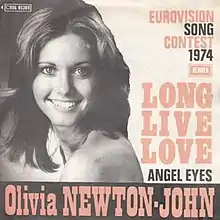Long Live Love (Olivia Newton-John song)
"Long Live Love" was the British entrant to the Eurovision Song Contest 1974 in Brighton, United Kingdom. It was sung by Olivia Newton-John in English.
 Cover of the Belgian release | |
| Eurovision Song Contest 1974 entry | |
| Country | |
| Artist(s) | |
| Language | |
| Composer(s) | |
| Lyricist(s) | |
| Conductor | |
| Finals performance | |
| Final result | 4th |
| Final points | 14 |
| Entry chronology | |
| ◄ "Power to All Our Friends" (1973) | |
| "Let Me Be the One" (1975) ► | |
Background
The song's composers, Valerie Avon and Harold Spiro, had worked together as staff writers for Belwin Mills Publishing since 1970 and had placed songs with several artists: Newton-John had recorded the Avon/Spiro composition "Don't Move Away" as a duet with Cliff Richard, the track serving as B-side to Richard's 1971 hit "Sunny Honey Girl".
A Song For Europe
"Long Live Love" was the third bid Avon and Spriro had made to have a song of their composing be the UK Eurovision entrant, having finished 4th in a field of six at A Song For Europe 1970 with "Can I Believe" while at A Song For Europe 1971 the Avon/Spiro composition "In My World of Beautiful Things" had finished 6th in a field of six.
Newton-John introduced one of each of the six nominated songs on a broadcast of Jimmy Savile's Clunk Click TV show; on 23 February 1974 a TV broadcast entitled A Song For Europe 1974 announced the tally of viewers' mailed-in ballots, with "Long Live Love" the clear victor at 27,387 votes. The runner-up, "Angel Eyes" - which was Newton-John's favourite - gained 18,018 votes.
Newton-John made recorded versions of all the songs she had performed for UK Eurovision 1974 consideration, these tracks making up half of Long Live Love, a December 1974 Olivia Newton-John album release, with "Angel Eyes" being utilized as the B-side of the single release of "Long Live Love."
At Eurovision
Considered a strong contender for Eurovision 1974, "Long Live Love" was performed second on the night of the final (following Finland's Carita Holmström singing "Keep Me Warm" and preceding Spain's Peret with "Canta y sé feliz"). The conductor for the number was Nick Ingman and Newton-John was backed by a five-woman chorale which included the Ladybirds, the trio who had sung backup for Sandie Shaw on her victorious performance of "Puppet on a String" at Eurovision 1967.
At the close of voting "Long Live Love" had received 14 points to place in a three-way tie for 4th in a field of 17, "Bye Bye I Love You" by Ireen Sheer singing for Luxembourg and "Celui qui reste et celui qui s'en va" by Romuald singing for Monaco also having accrued 14 points. Newton-John admitted post-contest: "I was never really happy with the song I had to sing."
"Long Live Love" was succeeded as British representative at the 1975 contest by The Shadows "Let Me Be the One". Olivia Newton-John would be the last solo act to represent the UK at Eurovision until Eurovision 1985.
Chart performance
In the British Isles "Long Live Love" charted in the UK with a #11 peak and reached #9 in Ireland: the track also afforded Newton-John a #11 hit in her adopted homeland of Australia. In anticipation of a boost from its expected strong Eurovision showing, "Long Live Love" was widely released throughout mainland Europe with the track having its highest global impact in Norway with a three-week chart peak tenure at #3, being kept from #1 by the chart-topping 1974 Eurovision victor "Waterloo" (ABBA) with first "Devil Gate Drive" (Suzi Quatro) and then "Seasons in the Sun" (Terry Jacks) at #2. However "Long Live Love" did not afford Newton-John widespread European success, otherwise charting only on Belgium's Dutch chart (#7) and in Finland (#9). Newton-John herself recorded a German-language version of "Long Live Love", while renderings in Norwegian and Finnish were recorded by respectively Gluntan (no) ("Det Er Et Sted") and Päivi Paunu ("Kun Rakastaa").
Chart positions
| Chart (1974) | Peak position |
|---|---|
| Australia (Kent Music Report)[1] | 11 |
| Ireland Top Singles Chart | 9 |
| UK Singles Chart | 11 |
References
- Kent, David (1993). Australian Chart Book 1970–1992. St Ives, NSW: Australian Chart Book. p. 217. ISBN 0-646-11917-6.
- This article was based on informations from: Diggiloo net
- Ewbank, Tim (2008). Olivia: the biography of Olivia Newton-John. London: Piatkus. p. 97-100. ISBN 978-0-7499-0984-0
| Preceded by "Power to All Our Friends" by Cliff Richard |
United Kingdom in the Eurovision Song Contest 1974 |
Succeeded by "Let Me Be the One" by The Shadows |